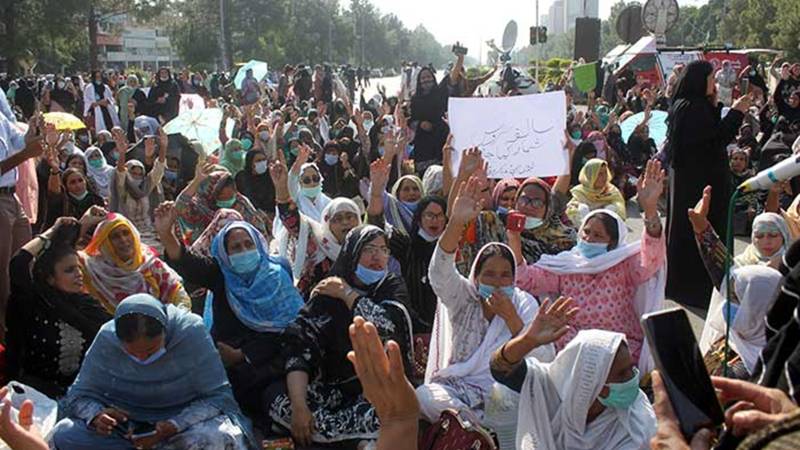
High inflation is a pressing issue all across Pakistan. But the Pakistani administered part of Jammu and Kashmir, also known as Azad Jammu Kashmir (AJK), is among the few places where common people – especially women – have come together to mount a resistance against anti-poor government policies. In particular, poor people have been hit hardest by high prices of food and electricity. AJK’s underwhelming bargaining power vis-à-vis Islamabad does not bode well for those in power in Muzaffarabad. In the imagination of an ordinary resident of AJK, the ruling elites of Muzaffarabad are nothing but sell-outs to highest bidders in Islamabad.
AJK consistently grapples with an alarmingly high unemployment rate. Official figures indicate that the unemployment rate in AJK is twice the national average in Pakistan. High unemployment and inflation are breeding grounds for social unrest and political upheavals. The region's mountainous and hilly terrain, coupled with deteriorating road infrastructure, contributes to elevated transportation costs. Consequently, people in AJK have to deal with substantially higher prices. Similarly, the people of AJK feel that their water resources have been used for the power generation, and therefore, they should get electricity at a lower rate. Thus, it is not merely the overall surge in prices but the relatively inflated prices and power hierarchy between Islamabad and Muzaffarabad have incited public outrage and driven people to the streets in protest against food inflation and high electricity bills.
This might come as a surprise to many but the role of young women is instrumental in mobilising people on issues of inflation and electricity bills. Historically, Azad Jammu Kashmir (AJK) operated as a self-sufficient agrarian economy, with family farms serving as the primary means of livelihood. It was commonplace for both women and men to work on farms. With a steady increase in population and decline of agriculture in AJK meant that people have to find employment in non-farm sectors of the economy. A dearth of employment opportunities in AJK has prompted a migration of male workers to Gulf countries in the past two decades. Presently, remittances constitute the primary source of income for the majority of households in AJK, and the economic ties between AJK and Gulf countries are more pronounced than those with mainland Pakistan. Although young women in AJK are more educated than their male counterparts but due to patriarchal societal values women are not allowed to migrate overseas on their own. This has created a unique situation in AJK where the most educated member of the household is usually a woman.
Furthermore, there exists a significant gender disparity concerning both labor force participation and unemployment rates in AJK. The female labor force participation rate in AJK is around 7%, significantly lower than the national average of 22% in Pakistan. It is crucial to emphasise that Pakistan's female labor force participation rate is among the lowest in South Asia. Despite the already low participation of women in the labor force in AJK, the female unemployment rate hovers around 23%. Not to mention, more young women have acquired higher education than men in AJK. As a result, political and social awareness has risen in AJK.
One of the key factors behind a successful social movement against inflation in AJK is the role of educated young women. They are aware of their individual and social rights and they are willing to politically fight for them. This is the power of education. Over the years, people of AJK have invested a lot in the education of their girls and this is a form of dividend of those investments.
The ongoing protests in AJK against food inflation and high electricity tariffs are spearheaded by grassroots action committees operating at the local village and bazaar levels. These committees, characterised by a non-hierarchical structure, consist of ordinary men and women who collaboratively deliberate and determine their course of action. This distinctive feature underscores the realisation that everyday people, especially young educated women, not only possess awareness and consciousness but can also spontaneously organise for their collective welfare. As Nelson Mandela famously noted: “Education is the most powerful weapon which you can use to change the world” and we see this unfolding in front of our eyes in AJK. I am optimistic that women of AJK will lead the movement for a progressive change in the near future.

